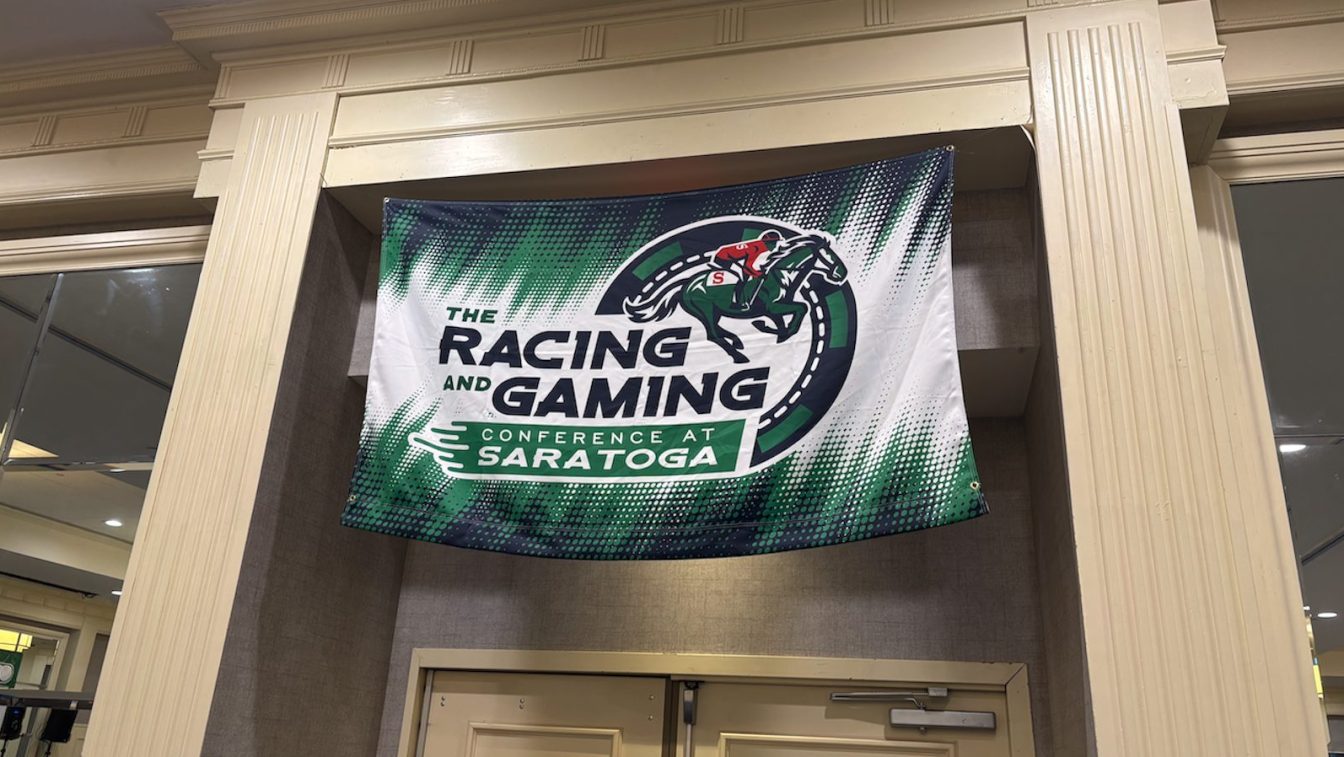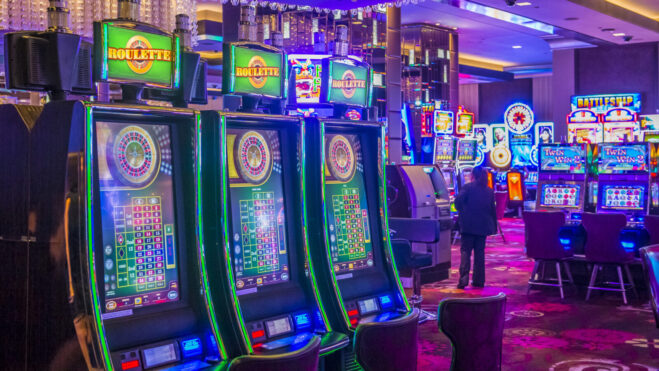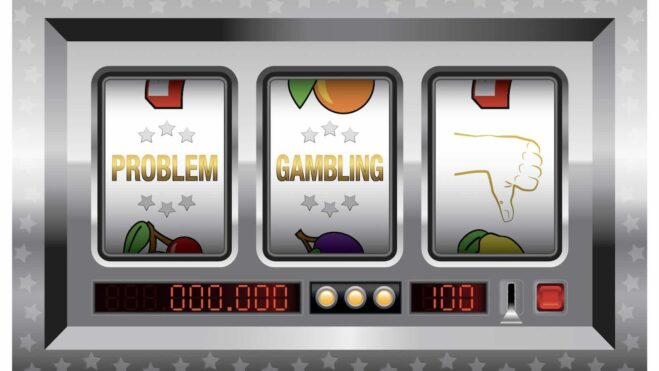Legalization, Regulation, Cannibalization … The Online Casino Debate Rolls On
Panelist: ‘Do you want the tax revenue, and do you want your citizens to be protected?’
4 min

Virtually every national gaming industry panel in the last several years has featured a panel on the tension between retail casino operators and iGaming operators seeking the passage of legislation of their product in more states. The inevitable question that always arises: Would online casino authorization cannibalize the revenue of those brick-and-mortar casinos — and thereby jeopardize thousands of jobs at those facilities?
But amidst the usual debate at the Saratoga Racing and Gaming Conference on Tuesday, FanDuel executive James Hartmann elected to reframe the entire issue around the fact that illegal and unregulated offshore iGaming sites already are prevalent anyway.
“The question shouldn’t be, ‘Should there or there should there not be iGaming?'” Hartmann said. “There already is iGaming, and Americans are betting hundreds of billions of dollars per year on it, except that in 43 states [without authorized iGaming], they are getting zero tax revenue. The gambling is done with offshore companies that don’t care about responsible gaming practices. So do you want the tax revenue, and do you want your citizens to be protected? That’s the real question.”
Whose reports do you believe?
What lawmakers across the U.S. tend to be faced with on the iGaming issue are reports from reputable industry analysts that are so contradictory that panel moderator Kim Copp, an attorney for the Chicago-based law firm of Taft Stettinius & Hollister, described the contrast as “stunning.”
In February 2024, Eilers & Krejcik’s 32-page report concluded that in six states that had legalized iGaming, land-based casino revenue rose by an average of 2.44% since the new gambling option arrived. The study was commissioned by iDEA (the iDevelopment and Economic Association), which describes itself as “the leading trade association for online gaming in the U.S.”
iDEA founder and general counsel Jeff Ifrah said at the time: “This study offers compelling evidence that online gambling is a catalyst for growth, not a competitor to land-based casinos. The research underscores the conviction that legalizing it drives beneficial economic impact across the industry. As lawmakers consider the merits of legalizing and regulating iGaming, they can be assured that it will complement the land-based casinos to deliver even more tax revenues to their states and establish meaningful consumer protections.”
But those same legislators researching this issue no doubt also later heard about a February 2025 study by The Innovation Group that, in its 79-page report, concluded that “iGaming steals revenue from existing gaming operations. Analysis of current iGaming states shows that brick-and-mortar casino revenue underperforms by 16.5% following iGaming introduction. This figure derives from comparing the results of iGaming states, which saw an approximately 4.3% decline in land-based revenue, against those in non-iGaming states, which experienced approximately 12.2% growth over the last five years. We believe this 16% figure will grow over time, as today’s young people, who are digital natives, become the core gambling industry consumer.”
It’s perhaps no wonder, then, that the growth of sports betting — now legal in 40 states — has not led to similar momentum for iGaming.
Tether or not
So what is a potential pathway for iGaming legalization proponents?
David Isaacson, a senior vice president for Spectrum Gaming Capital, said that if he was advising a brick-and-mortar casino client in a state that is mulling iGaming, he would emphasize that the client invest a large amount of its lobbying dollars in advocating for tethering of iCasino licenses to the state’s retail casinos — which already is the case in several states. That would mean that if mobile casino becomes even more lucrative in terms of gross gaming revenue than brick-and-mortar casinos, as has occurred in several recent months in New Jersey, the traditional casino operators would still benefit to an extent from the spending shift.
Isaacson added that casino operators need to recognize that they hold a “big stick” with lawmakers as a result of spending hundreds of millions for their facilities and for employing thousands of residents — also known as “voters.”
“They need to know the value they bring to the table,” Isaacson said.
Brian Hansberry, an executive in the gaming division for Delaware North, agreed that creating a partnership between brick-and-mortar casinos and iGaming operators “is the safest way for everybody.”
A secondary step would then become setting a tax rate for online casino. FanDuel’s Hartmann drew some chuckles from the audience at first for suggesting low tax rates that obviously would benefit his company. But Hartmann added that “there is a thought from some legislators that there is an infinite pot of money out there.”
He also said that as high tax rates mean fewer promotions for consumers, “people are inevitably going to go to the black market, and states get zero revenue from that. Everyone loses when states get too greedy.”
The comfort issue
But 83-year-old Meadowlands Racetrack operator Jeff Gural, who has a FanDuel sportsbook on his premises and who also operates a racino at Tioga Downs in upstate New York, offered another reason why legislators may be gun-shy on iGaming — especially if they are unaware of the magnitude of the illegal black market.
“Nobody ever mentions the moral issue — is it really a good idea for people to play online slot machines in their bedroom with a credit card?” asked Gural, who said he has younger family members who were not interested in following any sports until betting on it was legalized.
Hansberry and Isaacson also pointed to the danger of an increase in compulsive gambling in states where such activity is authorized. That leads to the conundrum of either keeping it illegal and thereby offering no rescue for those who are addicted, or legalizing it and then providing much-needed assistance — while perhaps also creating additional compulsive gamblers at the same time.
Gural said that the gaming industry “needs to be careful” if it wants to avoid the fate of the cigarette industry, which advertised so heavily that it was banned in the 1970s from featuring its product in television commercials. Hartmann countered by asserting that the pharmaceutical industry currently places 37 times as many ads as the gaming industry does.
As for which state is most likely to be next to legalize iGaming, the most popular panel pick was Maryland.





